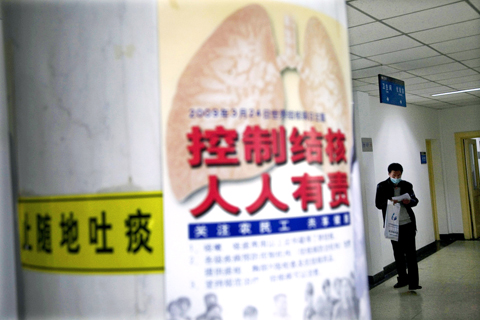The Beijing Chest Hospital was packed with people on a recent weekday morning. In the waiting area, Wang Chong, a migrant worker who has been fighting tuberculosis for several months, was facing a dilemma: Does he continue treatment that has already cost him more than US$5,000 or stop before his savings are wiped out?
It’s not only his health at stake. If Wang stops treatment prematurely, his tuberculosis is likely to morph into one of the new, hardier strains that resist the drugs he has been using and that pose a growing threat to global public health. Countries as diverse as China, Russia and South Africa are vulnerable, and the new strains have also appeared in the US.
“TB is now taking on a deadly new form — one that will spread further,” said Cornelia Hennig, the WHO’s TB program coordinator for China. “We can choose: Either we act now with rational and proven approaches, or we pay later with a worsening epidemic.”

PHOTO: AP
The WHO is trying to bring renewed vigor to the fight with a three-day meeting of health ministers from the worst-affected countries in Beijing starting tomorrow. Also attending are WHO Director-General Margaret Chan (陳馮富珍) and Bill Gates, co-chair of the Bill & Melinda Gates Foundation, a major contributor to research on global health problems. Countries are expected to draw up five-year plans to prevent and control the spread of drug-resistant TB.
TB is caused by germs that spread when a person with active TB coughs, sneezes or speaks. It’s ancient and treatable but now has evolved into stronger forms: multidrug-resistant TB, which does not respond to two top drugs, and extensively drug-resistant TB, which is virtually untreatable.
TB is usually treated in six months with a US$20 cocktail of four antibiotics, but its drug-resistant form takes up to two years to fight.
One of the culprits: Healthcare systems that lose track of patients who do not complete their courses of treatment, allowing the TB bacteria to develop resistance to normally potent medicines.
This is also a problem in India, where rural health care is often poor and there is little control over the sale of anti-TB drugs; Russia, which faces a shortage of qualified medical staff and drugs; and South Africa, where the disease thrives amid an AIDS epidemic that has weakened the immune systems of people with HIV.
An estimated half a million people in the world are already infected with drug-resistant TB, nearly a quarter of them in China.
Most are still waiting for help, which only increases the risk.
Less than 5 percent of people suffering from drug-resistant TB worldwide are properly treated, said Mark Harrington, executive director of Treatment Action Group, a US-based health advocacy group.
“So most of the people are going around coughing and spreading multidrug-resistant TB,” he said. “But most countries have not yet started to take it seriously.”

NO LIVERPOOL TRIP: Taiwan’s Lin Yu-ting, who won a gold medal in the boxing at the Paris Olympics, was embroiled in controversy about her gender at that event Taiwanese boxer Lin Yu-ting (林郁婷) will not attend this year’s World Boxing Championships in Liverpool, England, due to a lack of response regarding her sex tests from the organizer, World Boxing. The national boxing association on Monday said that it had submitted all required tests to World Boxing, but had not received a response as of Monday, the departure day for the championships. It said the decision for Lin to skip the championships was made to protect its athletes, ensuring they would not travel to the UK without a guarantee of participation. Lin, who won a gold medal in the women’s 57kg boxing

RESPONSE: The transit sends a message that China’s alignment with other countries would not deter the West from defending freedom of navigation, an academic said Canadian frigate the Ville de Quebec and Australian guided-missile destroyer the Brisbane transited the Taiwan Strait yesterday morning, the first time the two nations have conducted a joint freedom of navigation operation. The Canadian and Australian militaries did not immediately respond to requests for comment. The Ministry of National Defense declined to confirm the passage, saying only that Taiwan’s armed forces had deployed surveillance and reconnaissance assets, along with warships and combat aircraft, to safeguard security across the Strait. The two vessels were observed transiting northward along the eastern side of the Taiwan Strait’s median line, with Japan being their most likely destination,

‘NOT ALONE’: A Taiwan Strait war would disrupt global trade routes, and could spark a worldwide crisis, so a powerful US presence is needed as a deterrence, a US senator said US Senator Deb Fischer on Thursday urged her colleagues in the US Congress to deepen Washington’s cooperation with Taiwan and other Indo-Pacific partners to contain the global security threat from China. Fischer and other lawmakers recently returned from an official trip to the Indo-Pacific region, where they toured US military bases in Hawaii and Guam, and visited leaders, including President William Lai (賴清德). The trip underscored the reality that the world is undergoing turmoil, and maintaining a free and open Indo-Pacific region is crucial to the security interests of the US and its partners, she said. Her visit to Taiwan demonstrated ways the

The US has revoked Taiwan Semiconductor Manufacturing Co’s (TSMC, 台積電) authorization to freely ship essential gear to its main Chinese chipmaking base, potentially curtailing its production capabilities at that older-generation facility. American officials recently informed TSMC of their decision to end the Taiwanese chipmaker’s so-called validated end user (VEU) status for its Nanjing site. The action mirrors steps the US took to revoke VEU designations for China facilities owned by Samsung Electronics Co and SK Hynix Inc. The waivers are set to expire in about four months. “TSMC has received notification from the US Government that our VEU authorization for TSMC Nanjing